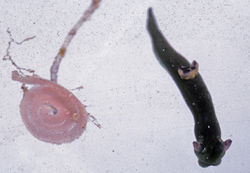Tambja amakusana
| Notice: | This page is derived from the original publication listed below, whose author(s) should always be credited. Further contributors may edit and improve the content of this page and, consequently, need to be credited as well (see page history). Any assessment of factual correctness requires a careful review of the original article as well as of subsequent contributions.
If you are uncertain whether your planned contribution is correct or not, we suggest that you use the associated discussion page instead of editing the page directly. This page should be cited as follows (rationale):
Citation formats to copy and paste
BibTeX: @article{Yonow2012ZooKeys197, RIS/ Endnote: TY - JOUR Wikipedia/ Citizendium: <ref name="Yonow2012ZooKeys197">{{Citation See also the citation download page at the journal. |
Familia: Polyceridae
Genus: Tambja
Name
Tambja amakusana Baba, 1967 – Wikispecies link – Pensoft Profile
- Tambja amakusana Baba, 1967: 15, fig. 3 (Japan); Marshall and Willan 1999[1]: 56, fig. 87 (Great Barrier Reef); Pola et al. 2006[2]: 510, figs. 10F, 13D, 15A-F (Japan, Papua New Guinea).
Material
Maldives: 11 mm (6 × 2 mm pres.), Old Shark Point, Thilafalhu reef, south end of North Malé Atoll, 10 m depth, 14 August 1995, leg. RC Anderson & SG Buttress.
Description
Animal dark to medium green with some relatively large white spots. Tail extremely long, almost half body length, and body appears to have been smooth. Five small multi-pinnate gills beige with purple tips; rhinophores beige suffused with purple; margins of rhinophore sheaths pale yellow. Flattened oral tentacles visible when crawling.
The preserved specimen is well relaxed: body light blue-green, gills and rhinophores white, rhinophores with 12 lamellae. Marshall and Willan (1990) state that there is no rhinophoral sheath; none is visible on the specimen but the rim of the right rhinophore is visible in Plate 23 where it catches the light. Baba (1967)[3] described and illustrated the genital opening just below the right rhinophore whereas Pola et al. (2006)[2] located it halfway between the gills and the rhinophore; in this specimen, an orange puckered pore also occurs halfway. The collectors noted that the animal laid a light pink spiral egg mass 4 mm in diameter its second night in captivity; it has barely more than three complete whorls laid close together (Plate 23).
Distribution
Tambja amakusana is recorded for the first time from the Indian Ocean; all literature records to date are listed in the synonymy. The only similarly small species with purple tips to the gills and rhinophores is Tambja limaciformis (Eliot), but this species is usually brick to orange red, with many more white spots, occurring throughout the tropical Indo-West Pacific (e.g. Yonow 2008[4]).
Taxon Treatment
- Yonow, N; 2012: Opisthobranchs from the western Indian Ocean, with descriptions of two new species and ten new records (Mollusca, Gastropoda) ZooKeys, 197: 1-130. doi
Other References
- ↑ Marshall J, Willan R (1999) Nudibranchs of Heron Island, Great Barrier Reef. A survey of the Opisthobranchia (sea slugs) of Heron and Wistari Reefs. Backhuys Publishers, Leiden, Netherlands, 257 pp.
- ↑ 2.0 2.1 Pola M, Cervera J, Gosliner T (2006) Taxonomic revision and phylogenetic analysis of the genus Tambja Burn, 1962 (Mollusca, Nudibranchia, Polyceridae). Zoologica Scripta 35: 491-530. doi: 10.1111/j.1463-6409.2006.00241.x
- ↑ Baba K (1967) Two new green-colored species of Tambja from Japan (Nudibranchia: Polyceridae). Venus 46 (1): 13-18.
- ↑ Yonow N (2008) Sea Slugs of the Red Sea. Pensoft Publishers, Sofia-Moscow, 304 pp.
Images
|
